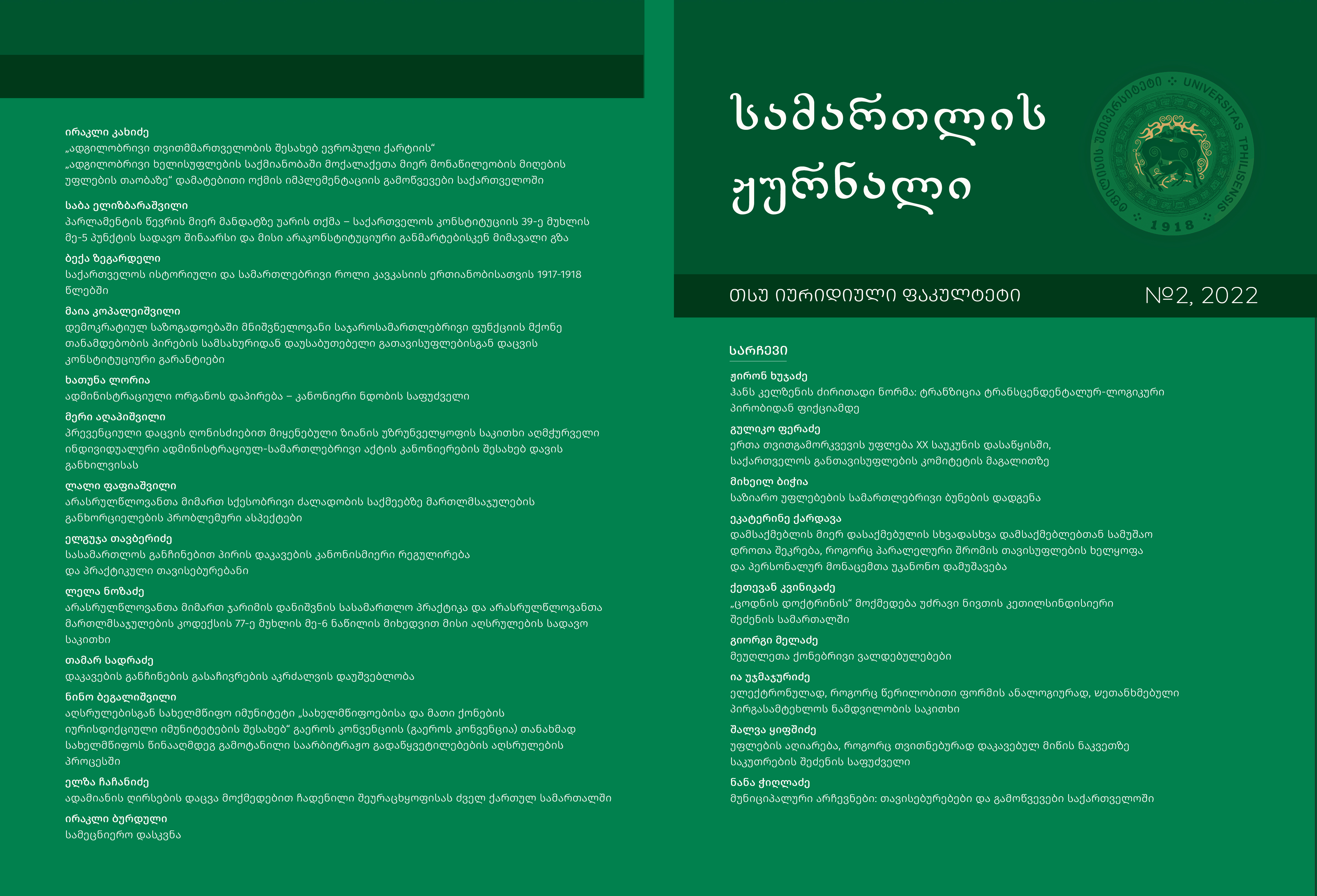პარლამენტის წევრის მიერ მანდატზე უარის თქმა - საქართველოს კონსტიტუციის 39-ე მუხლის მე-5 პუნქტის სადავო შინაარსი და მისი არაკონსტიტუციური განმარტებისკენ მიმავალი გზა
DOI:
https://doi.org/10.60131/jlaw.2.2022.7026საკვანძო სიტყვები:
კონსტიტუცია, პარლამენტის წევრის უფლებამოსილების შეწყვეტა, კონსტიტუციის ნორმის ინტერპრეტაცია, თავისუფალი მანდატი.ანოტაცია
საქართველოს კონსტიტუცია ადგენს, რომ პარლამენტის წევრს უფლებამოსილება ვადამდე შეუწყდება თუ იგი უფლებამოსილების შეწყვეტის შესახებ პირადი განცხადებით მიმართავს პარლამენტს. ამ ნორმის საფუძველზე, 2020 წლის დეკემბერში 54-მა ოპოზიციონერმა დეპუტატმა პარლამენტს სადეპუტატო უფლებამოსილების შეწყვეტის მოთხოვნით მიმართა. ისინი მეათე მოწვევის პარლამენტს „ბოიკოტს“ უცხადებდნენ და პოლიტიკური პროტესტის გამოხატვას სწორედ პარლამენტის წევრის უფლებამოსილებაზე უარის თქმით ცდილობდნენ. ამის საპასუხოდ, საქართველოს პარლამენტმა არ დააკმაყოფილა პარლამენტის წევრების მოთხოვნა მათი უფლებამოსილების ვადამდე შეწყვეტის თაობაზე. საპარლამენტო უმრავლესობის ეს გადაწყვეტილება კონსტიტუციის ნორმის ახლებურ ინტერპრეტაციას ეყრდნობა, რომელიც არაერთგვაროვანი შეფასებების საგანი გახდა.
სტატიაში განხილულია საქართველოს კონსტიტუციის 39-ე მუხლის მე-5 პუნქტის სადავო შინაარსი და წარმოდგენილია მისი ინტერპრეტაციის შესაძლებლობების ანალიზი. ნორმის განმარტების მეთოდების საფუძველზე, შემოწმებულია პარლამენტის მიერ შემოთავაზებული ინტერპრეტაციის ხარვეზები და გამოვლენილია ნაკლოვანებები. პარლამენტის მიერ მიღებული გადაწყვეტილების ჭრილში, წარმოდგენილია მსჯელობა კონსტიტუციის ნორმის ინტერპრეტაციასა და კონსტრუირებას შორის არსებულ მიმართებაზე. ამასთან, სტატიაში განხილულია პარლამენტის წევრის უფლებამოსილების შეწყვეტის საკითხის მიმართება გადაწყვეტილების მიმღებ დეპუტატთა თავისუფალ მანდატთან.
წყაროები
Constitution of Georgia, 24/08/1995.
Constitution of Sweden, 1974 (rev. 2012).
Constitution of Ukraine, 1996 (rev. 2016).
Constitution of Türkiye, 1982 (rev. 2017).
Rules of Procedure of the Parliament of Georgia, 06.12.2018.
Resolution #153-IVმს-Xმპ of the Parliament of Georgia from February 2, 2021.
Resolution of the Parliament of Georgia of January 4, 2021 #53-IIრს-Xმპ;
Resolution of the Parliament of Georgia of January 4, 2021 #54-IIრს-Xმპ;
Resolution of the Parliament of Georgia of January 4, 2021, #55-IIრს-Xმპ
Resolution of the Parliament of Georgia, May 25, 2021 N487-IVმს-Xმპ.
Conclusion of the Procedural Issues and Rules Committee of the Parliament of Georgia dated January 28, 2021 #-2-882/21.
Minutes of the Meeting of the Procedural Issues and Rules Committee of the Parliament of Georgia on January 28, 2021 #13.
Barnett R.E., Interpretation and Construction, Georgetown Public Law and Legal Theory Research Paper, 34 Harv. J.L. & Pub. Pol’y, 65-72, 2011, 66.
Burke E., The Writings and Speeches of Edmund Burke, Vol. 3, eds. P. Langford and W. B. Todd, Oxford University Press, 1996, 63.
Chafetz J., Leaving the House: The Constitutional Status of Resignation from the House of Representatives, Duke Law Journal, Vol. 58, no. 2, 2008, 226.
Chmyha A., The Legal Grounds of Emergence and Termination of Mandates of Members of Parliaments in Belarus and Poland: a Comparative Analysis, Biaostockie Studia Prawnicze, Vol. 24, #4, 143-152, 2019, 149.
Demetrashvili A., Kobakhidze I., Constitutional Law, Tbilisi, 2011, 210 (in Georgian).
Eremadze K., Fundamental Rights for Freedom, Tbilisi, 2020, 8 (in Georgian).
Goldsworthy J., Interpreting Constitutions: A Comparative Study, Oxford University Press, 2006, 102.
Hamilton A., Madison J., Jay J., The Federalist Papers (1788), Rossister C. (ed.), Signet Classics, 2003, letters #57 and #78.
Iliec C., Analytical Perspectives on Parliamentary and Extra-parliamentary Discourses, Journal of Pragmatics 42, no.4, 2010, Jones P., Berrington H., Party, Parliament and Personality: Essays Presented to Hugh Berrington, London, Routledge, 879-884, 1995, 880.
Khetsuriani J., The Authority of the Constitutional Court of Georgia on the Issues of Constitutionality of Recognition or Early Termination of the Powers of a Member of the Parliament, Justice and Law, #3 (42)14, 2014, 19 (in Georgian).
Laundy P., Parliaments in the Modern World, Dartmouth, 1989, 11.
Linn S., Sobolewski F., The German Bundestag: Functions and Procedures: Organisation and Working Methods: the Legislation of the Federation, NDV, 2015, 11-12;
Locke J., Two Treatises of Government, ed. P. Laslett (ed.), Cambridge University Press, 1999, 366-367.
Mill J. S., Considerations on Representative Government [1861], Prometheus Books, 1991, 118.
O'Donnell G., Delegative Democracy (1994), from Politics and Democracy, ed. Nabakhteveli E., Intellect Publishing House, Tbilisi, 2020, 263 (in Georgian);
Pakte P., Melen-Sukramaniani F., Constitutional Law, 28th edition (as of July 2009), Tbilisi, 2012, 49, 93 (in Georgian).
Rai S.M., Johnson, R.E., Democracy in practice: Ceremony and Ritual in Parliament, Palgrave Macmillan, 2014, 21.
Redish M. H., Arnould M. B., Judicial Review, Constitutional Interpretation, and the Democratic Dilemma: Proposing a “Controlled Activism” Alternative, 64 Fla. L. Rev. 2012, 1486, 1489.
Sajó A., Uitz, R., The Constitution of Freedom: An Introduction to Legal Constitutionalism, Oxford University Press. 2017, 221.
Sajó A., Limiting Government: An Introduction to Constitutionalism (1999), publishing house “Sezani”, T. Ninidze (ed.), Trans. M. Maisuradze, 2003, 62, 95-96, 137 (in Georgian).
Scalia A., Wood G., Tribe L., Glendon M., Dworkin R., A Matter of Interpretation: Federal Courts and the Law, Gutmann A. (ed.), Princeton, New Jersey: Princeton University Press, 1997, 17, 23.
Solum L. B., The Interpretation-Construction Distinction, Georgetown Law Faculty Publications and Other Works, 95-118, 2010, 101-102.
Strøm K., Mueller W.C., Bergman T., Delegation and Accountability in Parliamentary Democracies, Oxford University Press, 2005, 354.
Van Der Hulst M., The Parliamentary Mandate: A Global Comparative Study, Studies on Comparative Parliamentary Law, Inter-Parliamentary Union, Geneva, 2000, 9.
Venice Commission, Opinion on the Amendments to the Rules of Procedure of the Verkhovna Rada of Ukraine, adopted by the Venice Commission at its 112th Plenary Session (Venice, 6-7 October 2017);
Venice Commission, Parameters on the Relationship between the Parliamentary Majority and the Opposition in a Democracy: a checklist, adopted by the Venice Commission at its 119th Plenary Session (Venice, 21-22 June 2019), 25.
Zippelius R., Juristische Methodenlehre (10th Revised Edition), München, 2006, 28, 53, 75, 88 (in Georgian).
Constitutional complaint #1565 and #1569 of February 10 and 16, 2021.
Decision #3/1/659 of the Constitutional Court of Georgia dated February 15, 2017 on the case - Georgian citizen Omar Zorbenadze against the Parliament of Georgia, II-20.
Decision No. 3/2/1473 of the Constitutional Court of Georgia dated September 25, 2020 on the case - Nikanor Melia vs. Parliament of Georgia, II-7.
Karácsony and others v. Hungary [GC], European Court of Human Rights, Application nos. 42461/13 and 44357/13, Judgment of 17 May 2016.
Gorzelik and Others v. Poland [GC], European Court of Human Rights, Application no. 44158/98, Judgment of 17 February, 2004.
Powell v. McCormack, 395 U.S. 486, U.S Supreme Court, 1969
ჩამოტვირთვები
გამოქვეყნებული
როგორ უნდა ციტირება
გამოცემა
სექცია
ლიცენზია

ეს ნამუშევარი ლიცენზირებულია Creative Commons Attribution-ShareAlike 4.0 საერთაშორისო ლიცენზიით .









